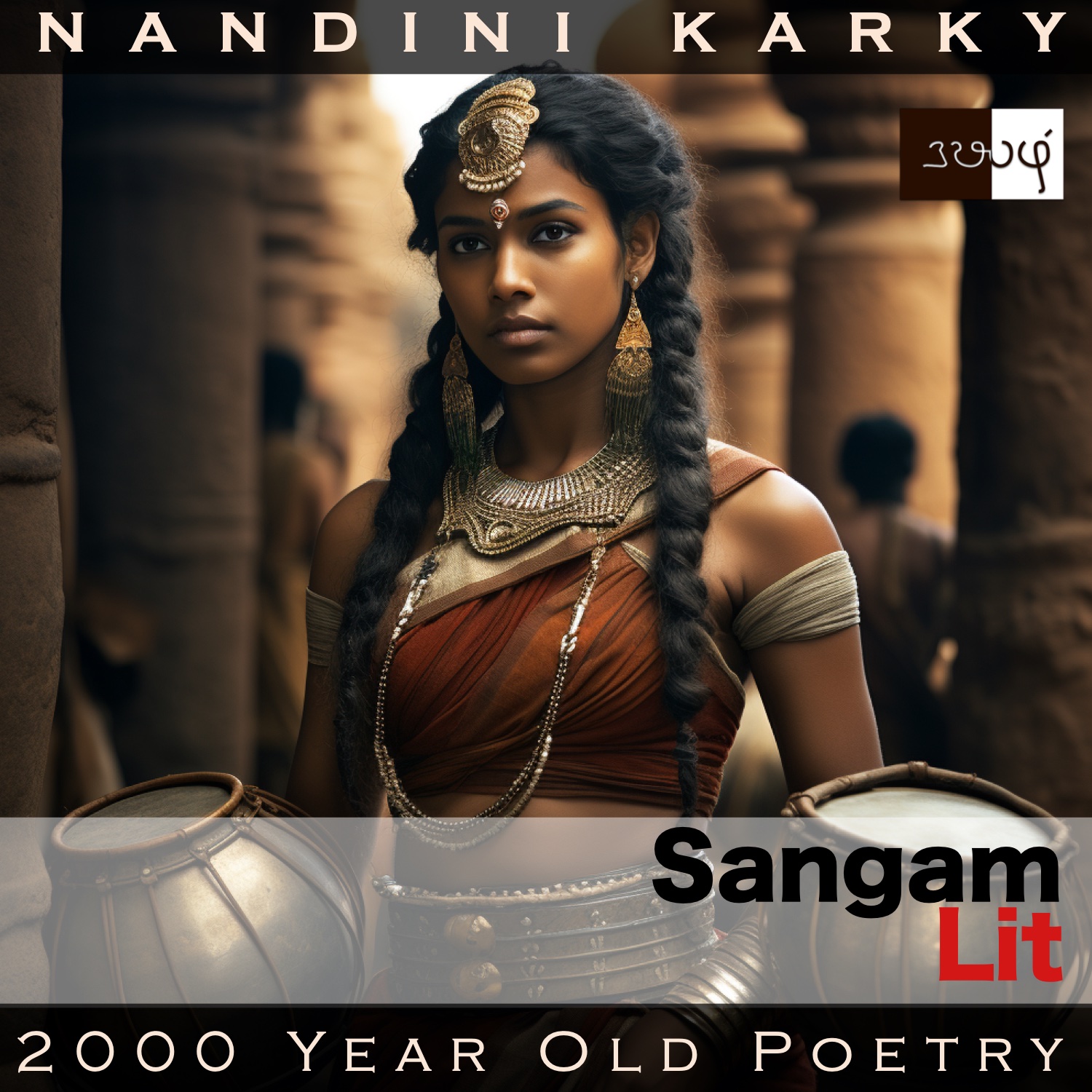Podcast: Play in new window | Download
Subscribe: Apple Podcasts | Spotify | Amazon Music | Android | iHeartRadio | TuneIn | RSS | More
In this episode, we perceive the proud and upright stance of a poet, as portrayed in Sangam Literary work, Puranaanooru 206, penned to the Velir King Athiyamaan Nedumaan Anji, by the famous female poet Avvaiyaar. Set in the category of ‘Paadaan Thinai’ or ‘Praise’, the verse records the affront experienced by this poet because of the king’s attitude.

வாயிலோயே! வாயிலோயே!
வள்ளியோர் செவிமுதல் வயங்குமொழி வித்தி, தாம்
உள்ளியது முடிக்கும் உரனுடை உள்ளத்து
வரிசைக்கு வருந்தும் இப் பரிசில் வாழ்க்கைப்
பரிசிலர்க்கு அடையா வாயிலோயே!
கடுமான் தோன்றல் நெடுமான் அஞ்சி
தன் அறியலன்கொல்? என் அறியலன்கொல்?
அறிவும் புகழும் உடையோர் மாய்ந்தென,
வறுந் தலை உலகமும் அன்றே; அதனால்,
காவினெம் கலனே; சுருக்கினெம் கலப்பை;
மரம் கொல் தச்சன் கை வல் சிறாஅர்
மழுவுடைக் காட்டகத்து அற்றே
எத் திசைச் செலினும், அத் திசைச் சோறே.
What a delight to listen to the words of this great lady from the Sangam era! Poet Avvaiyaar is back with a powerful song. We have heard so many words of praise about King Athiyamaan Neduman Anji sung by this poet. Interestingly, this song happens before those events we have already encountered. In fact, it happens when Avvaiyaar, learning about the immense generosity of Athiyamaan, decides to visit him for the first time, and he too, learning of her vast talent, is eager to get to know her. However, as is the case with some kings, he decides to delay giving her reward, probably because he wants to see more of her. It’s in this situation, the poet renders these words:
“O Doorkeeper! O Doorkeeper! You are someone who never shuts the gates to supplicants, who live a life of seeking grace from others by sowing words in the ears of the mighty, having a strong heart to accomplish what they set out to and always worriedly seeking a better state. Does the great descendant having speedy horses, Neduman Anji, not know about himself? Does he not know about me? Even though they who have wisdom and fame have perished, the world has not yet become barren; And so, I gather my stringed instruments in bundles and I tie up my drums in string bags; Just like how the crafty-handed young children of a woodcutter are sure to find trees, when they go to the forest, whichever direction I go, in that direction, I shall find food!”
Time to delve into the nuances of this interesting verse. The poet address the guard at the entrance of the king’s court, talking about how he never shuts the gates to those supplicants, who come wishing to sow words in the ears of the rich and powerful and harvest wealth of gifts in return. Such is their unenviable status, which depends on those above them to better their life. Through that description, the poet sketches how the gatekeeper is kind, and also, how difficult the life of a supplicant is! After this, she puts forth two piercing questions asking whether the king inside does not know who he is, and also, does he not know who she is. By that, she means, ‘Is he not aware of the great fame he has, in never disappointing those who come seeking to him?’ and also, ‘Does he not know of my capabilities and rank among poets?’.
After those rhetorical questions, she adds, ‘It’s not like the world has become bereft of anyone with compassion because those with fame and wisdom have perished’. This statement possibly refers to the death of great patrons like King Paari. Saying that, she says right then, she’s tying up her bundles of instruments and tightening the strings of her drum bags. So much action she registers in those words. Then, before she follows up on these preparatory acts, she pauses to mention a simile. Imagine when the children of a woodcutter taking axes on their shoulders head to the forest in search of trees, won’t they be sure to find it? Likewise, she concludes with the words that no matter where she goes, there she’ll find food. With that, she vehemently declares that she’s not there just seeking food at the king’s court and adds, if the king will not heed her presence, then there are other places which will honour her the right way.
Hearing this, no doubt the king relented from his stance of aloofness and welcomed her as she should have been. That’s why later the events leading to all those songs illustrating the great friendship between this poet and king happened. While the concept ‘love at first sight’ sounds so romantic, what makes a more interesting storyline is ‘love at first fight’, when the protagonists clash at first and then their feelings change. It’s the same situation happening here, and while it’s not about love, but about a friendship that will be celebrated for ages. In the words of this verse, the self-confidence, integrity and sharpness of this lady, who knows who she is, shines so bright, and it moves me to think that she was who she was, in a past time, more than two thousand years ago, in a world dominated by men. A true inspiration to women everywhere and for all time!




Share your thoughts...